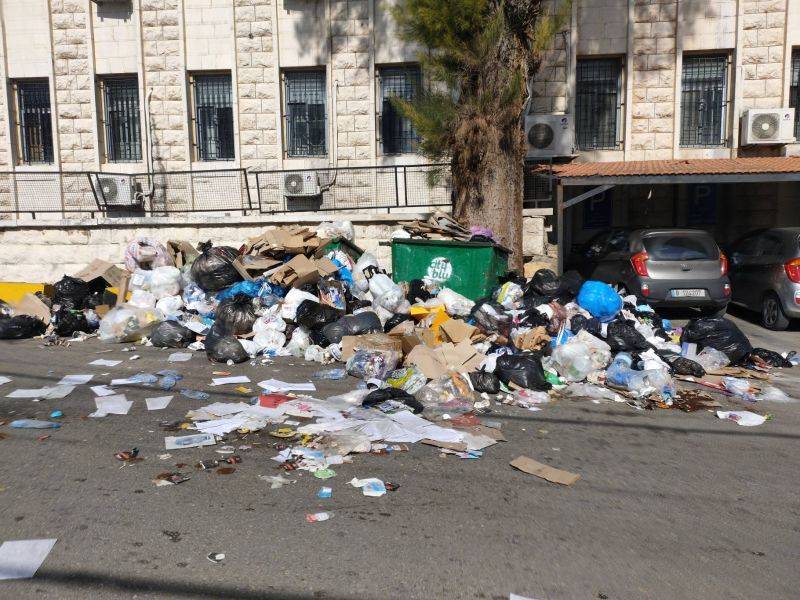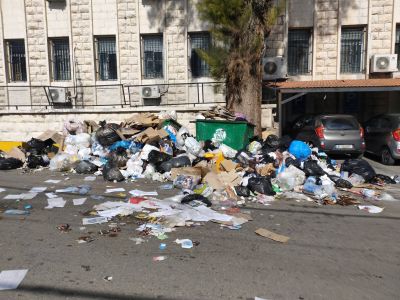
A mountain of garbage in the vicinity of the Baabda courthouse. (Credit: C.A)
“We cannot continue to go to the Baabda courthouse as long as there are humiliating working conditions that undermine our dignity.” This is the essence of the announcement that Ghada Abu Karroum, Nadine Najm and Amal Eid – respectively the president and counselors of the 11th chamber of the Mount Lebanon Appeals Court – published last Wednesday on a private WhatsApp group for judges. The announcement spread like wildfire on social media. “Is it excessive to ask for garbage collection, or electricity, or water in the toilet?” the three judges asked, adding, “Judicial duties do not preclude the right to work in a healthy environment.”
Any litigant might feel the disarray when approaching the courthouse of the largest muhafaza (Mount Lebanon), where hundreds of citizens trek daily to settle their administrative, legal and judicial affairs.
A few meters from the building, they are greeted by two dumpsters vomiting garbage. If the sun is invigorating on this February morning, the dumpsters exhale so much pestilence that it is necessary to hold one’s breath. That’s not all. Between the dumpsters and the entrance of the building, the roadway is littered with plastic bags, empty water bottles, coffee cups, aluminum cans ... the flotsam of a winter storm three days earlier.
Inside the courthouse, the staircase leading to the court clerks’ offices and courtrooms is filthy, covered in a sticky black dust. Every step is littered with cigarette ends and discarded tissues.
“It is probably because of the severely neglected state of the building that people who enter it do not bother to look for a trash can,” one lawyer remarked to L’Orient-Le Jour. Yet there are garbage cans on this floor: In one corner, a huge brown bag is filled to the brim with garbage that has probably been accumulating for days; a green basket hanging on a wall is also full; across the hall, another is overturned, garbage scattered around it.
When approached by the L'Orient-Le Jour, a magistrate testifies to the lack of hygiene and means, which forces her and other magistrates to perform extra-judicial tasks. “We clean the dust from our desks because no one else does. We do the same in the courtrooms, so that our fingers and files aren’t blackened by contact with dirty surfaces.”
She adds, “The disastrous situation in the courts has been going on for years, but with the multi-faceted crisis and the depreciation of the currency, it is getting worse. So we end up paying for supplies (paper, pencils, printer ink, etc.) out of our own pockets so as not to impede the formalities and trials underway.”
By the light of the mobile phone
The courthouse’s gloomy atmosphere is not only due to the filth. The lack of electricity has plunged the narrow corridors into darkness.
“Here, darkness is the rule, and light, and therefore electricity, is the exception,” said a lawyer, trying to decipher the pages of a file with his mobile phone’s flashlight. “The obsolescent electrical system caused a short circuit,” he explains, saying, “the breakdown is not recent, but the replacement of the defective equipment is not included in any budget.”
A little further on, the elevator does not work. “Even when electricity is provided, it remains out of order,” says another lawyer, lamenting that one of his clients, a person with special needs, cannot attend the trial hearings that concern him because he can’t access the courtroom. The courthouse has no electricity, but also no oil, and therefore no heat.
“During the storms, I was freezing,” complains Makram*, a court clerk whose 7m2 office is overrun with thousands of ochre-colored envelopes containing the files for which he’s responsible. The stench of them is unbearable. From time to time, Makram brings mothballs to “prevent the appearance of moths”.
“I am 32 years old, seven of which I spent in this suffocating room,” he says. “I don’t know how many years I’ll stay healthy before I get asthma or some other respiratory ailment.”
He has been wearing a mask at his workplace since before the coronavirus pandemic.
During the summer season, it’s no better. “In the summer, we suffocate. Look at this window, I can’t open it,” says Makram, pointing to an air conditioning pipe that blocks the opening of the window. Ochre papers, cut from file envelopes, are glued on the windows. They serve as “curtains” when the sun is strong, Makram explains.
Manual filing
There is no computer on the young clerk’s desk, nor on the desks of his colleagues. In 2022, filing and archiving remain strictly manual. Rania*, an officer of the court, holds a large notebook. “I write in this register all the numbers and names of the files to be examined by the court during the next hearings”, she says, gesturing to the two huge bags at her feet, in which are piled the dozens of files in question.
To get from one room to the other, one wades through large puddles of water. The reflex is to look up to discover their origin. Mouldy and flaking, the ceiling is no longer waterproof.
Ironically, water is nowhere to be found where it is needed. In the event of pressing need, it is impossible to use the toilet. The toilets are locked, in fact, due to the lack of water and housekeeping staff.
“If we have an urgent need, we have to go out because we don’t have access to the toilet,” a security guard told L'Orient-Le Jour. However, judges and civil servants have their own toilets, which they maintain with the means at hand. The same goes for lawyers, who have to ask for the key from an employee of the Bar Association, whose office is on the first floor. Activated momentarily during the lightning passage state electricity, the pumps require time to fill the pipes with water … It is a humiliating and degrading work environment at all levels.
“Our dignity does not allow us to continue our work in such circumstances,” says a senior judge who supports the decision of his three colleagues. “How can we do justice when our most basic rights are denied? The claims of Ms. Abou-Karroum, Najm and Eid are understandable and legitimate. The issue is not only to safeguard their dignity, but that of the entire body of the judiciary – lawyers, justice and the state,” says the judge. If nothing is done to find a solution, many of my colleagues could follow their example,” he warns, hammering that, “if levels of resilience are unequal among individuals, it has its limits, even among the toughest.”
It remains for the state, and more particularly the Minister of Justice, Henri Khoury, to hear this warning. For the time being, Khoury has not responded to inquiries from L’Orient-Le Jour — particularly on the point of knowing if there are any plans to bring the Baabda courthouse out of the darkness. Darkness is a sad, but appropriate, metaphor for the current state of justice in Lebanon.
*First names have been changed.
This article was originally published in French in L'Orient-Le Jour.
